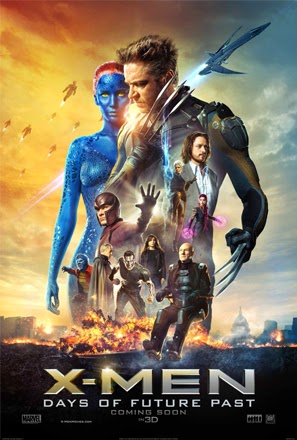I saw the Uncanny X-Men, contained in "Days of Future Past", and in that the movie deals with time-travel, I've decided to mesh my "I saw..." category with "Time Travel Time", with the latter being the overriding label. On the other hand, I suppose, thematically, there's as much an alternate-reality element to the film to have justified a post dealing exclusively with that concern, but be that as it may.
Directed by the perpetually competent Bryan Singer, who held the reins on the first and second X-Men movies, "Days" is based on the '81 Marvel adventure created by Chris Claremont and John Byrne (which was then adapted for the '90s animated series), but title-wise is perhaps best known as a classic, progressive-rock album by the Moody Blues.
The yarn's obvious novelty is how it presents younger versions of the mutants (previously seen in "First Class") with their later versions (last seen in "Last Stand"). However, to make this all work, it's up to Logan, the Wolverine (Hugh Jackman, again expertly taking his performance to the virile hilt), who becomes a most determined mutant-with-a-cause, as he "quantum leaps" back into his early '70s persona, courtesy of Kitty Pryde (Ellen Page)'s mystical powers. Wolverine is, in essence, the anchor of this weird tale, around whom the entire escapade revolves.
As with the original comic-book story, Simon Kinberg's script initially focuses on the near future, where both the human and mutant populations have been virtually terminated by an army of giant, dictatorial robots: the Sentinels. These lethal automatons were designed by famed scientist Bolivar Trask (Peter "Game of Thrones" Dinklage) in '73, as a proposal to President Richard Nixon (Mark Camacho), after the enticing Mystique (Jennifer Lawrence, in all of her naked, blue glory) tires to assassinate him. (It should be noted that the movie also references how Trask was, in fact, already slain by Mystique in another timeline, but it's in the primary track we behold that he applies her morphing ability to his prized machines.) Through all of this, Wolverine has the arduous task of convincing the past principle characters that an attempt on Trask's life by a mutant will surely launch the Sentinels' monstrous rise.
In truth, watching old and new intermingle, or bounce between time lines, is probably "Days" most complex aspect. It also gives the various classic counterparts a chance to see through different lenses (much as they did in "X-Men United"). In this regard, the story's real conflict isn't so much how the mutants will erase the Sentinels, but rather how Xavier and Magneto, in particular, can come to terms with their own fears, prejudices and sacred believes to accomplish that monumental task.
"Days" also makes one ponder how other alternate-reality installments, whether "First Class" (or for that matter, any of the X-men jaunts), "Planet of the Apes", "Star Trek", "Watchmen" or the recent smash, "Winter Soldier", fit into the grand scheme of existence. Into which does our own reality fit among such, and if in none (as seems clearly the case), are we merely seated spectators to these never-ending sprees, or in some elusive way, participants?
That's a pretty thick notion to chew upon, and "Days" does a deft job at making it nice and juicy. It will be fascinating to see how this X-Men chapter impacts those that follow, but just based on this entry's thought-provoking aspects alone, don't be surprised if "Days" turns out to be the most influential in this enduring series.









No comments:
Post a Comment